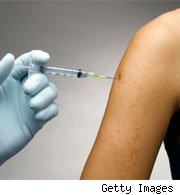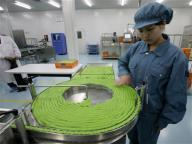
High street pharmacy offers cervical cancer vaccine for £405
The Cervarix vaccine which protects against the two strains of humanpapilloma virus responsible for the majority of cases of cervical cancer is available to girls aged between 12 and 18 on the NHS as part of a national vaccination programme.
However older women have been requesting the vaccine from their GPs only to be turned down in most cases. Cervarix and its rival Gardasil are available privately.
Government scientists advised that young girls be offered the vaccine as the virus is transmitted through intimate contact and sex and is less effective in women who have already been exposed to the virus.
Fears have also been raised that women may be given a false sense of security through having had the vaccine and not attend for cervical smear tests in future.
Boots the chemist is offering the service to women aged between 18 and 54 in 134 of its stores in England and Wales following successful pilots in ten stores in London which began in November last year.
Lloydspharmacy also offers the vaccine in almost 300 of its stores.
Women will not be tested to establish if they have already been infected with the HPV strains 16 and 18 which are included in the vaccine and so cannot be sure whether it will offer them substantial benefit.
Evidence considered by the Government advisers on the Joint Committee on Vaccination and Immunisation showed that one in ten women aged between 20 and 29 were already infected with HPV strain 16.
In recommending that girls aged 12 be routinely vaccinated with a catchup campaign offering it to all girls aged up to 18, a statement from the JCVI said: “Vaccination of girls above this age was not cost-effective given the assumed cost of vaccine and administration, and the increase in prevalence of previous infection in this age group.”
Sarah Woolnough, Cancer Research UK’s head of policy, said: “The best way that older women can protect themselves against cervical cancer is through the free NHS cervical screening programme, which has saved 100,000 lives since its introduction in 1988.
“We strongly advise all women to attend cervical screening when invited, even if they have had the HPV vaccination.
“We don’t yet know how effective the vaccine is in women who have already come into contact with HPV.”
However Dr Anne Szarewski, clinical consultant at Cancer Research UK’s centre for epidemiology at the Wolfson Institute of Preventive Medicine, is backing the Boots programme.
She said the chances of having contracted both strain 16 and 18 were just five per cent.
Dr Szarewski said: “And, even if you do catch HPV then a lot of people – around 50 per cent – will clear it from their bodies and not be immune.
“Even if you have an antibody response, this does not mean you are protected in the future.
“There is no reason why an individual woman should not have this vaccine.”
Dr Graham Marshall, Boots Medical Director, said: “As this vaccination is only available on the NHS through the schools’ vaccination programme, most women above the age of 18 will not be aware that they could benefit from the vaccination. Pharmacists are well placed to offer this service with convenient high street locations and a welcoming, familiar atmosphere.
“Boots pharmacists have undergone comprehensive training – written and agreed by an independent panel of experts – to provide this innovative, patient-led service. The consultation includes advice on sexual health and the importance of regular cervical screening.”
A Department of Health spokesman said: “The NHS runs a free HPV vaccination programme for girls from 12-18 years of age which will save the lives of up to 400 women each year.
“We strongly encourage all women over 25 to be regularly screened to help protect them from cervical cancer.
“Careful consideration was given to vaccinating older women. However, the national HPV vaccine programme aims to protect girls and young women before they are exposed to the human papillomavirus, where research shows that vaccination is most effective. The programme has been a great success with over three quarters of girls aged 12-13 years already having received all three doses of the vaccine.”
High street pharmacy, High street pharmacy Health, High street pharmacy Health Latest, High street pharmacy Health Information, High street pharmacy Health information, High street pharmacyHealth Photo,Exercising for Weight Health photo, High street pharmacy Health Latest, High street pharmacyHealth latest, Exercising for Weight Health Story, Healthy Minnesota Health story, High street pharmacy Video, High street pharmacy video, High street pharmacy Health History, High street pharmacy Health history, High street pharmacyover Picture, history, High street pharmacy Asia, Healthy Minnesota asia, High street pharmacy Gallery, Exercising for Weight gallery, High street pharmacy Photo Gallery, Healthy Minnesota photo gallery, High street pharmacy Picture, High street pharmacy picture, High street pharmacy Web, Malaysia Health, web Health, web Health picture, video photo, video surgery, gallery, laparoscopy, virus, flu, drug, video, Health Health, calories, photo, nutrition, health video, symptoms, cancer, medical, beating, diet, physical, Training, organic, gym, blister, exercise, weightloss, surgery, spiritual, eating, tips, skin, operation, bf1, High, street, pharmacy, offers, cervical, cancer, vaccine, for, £405




